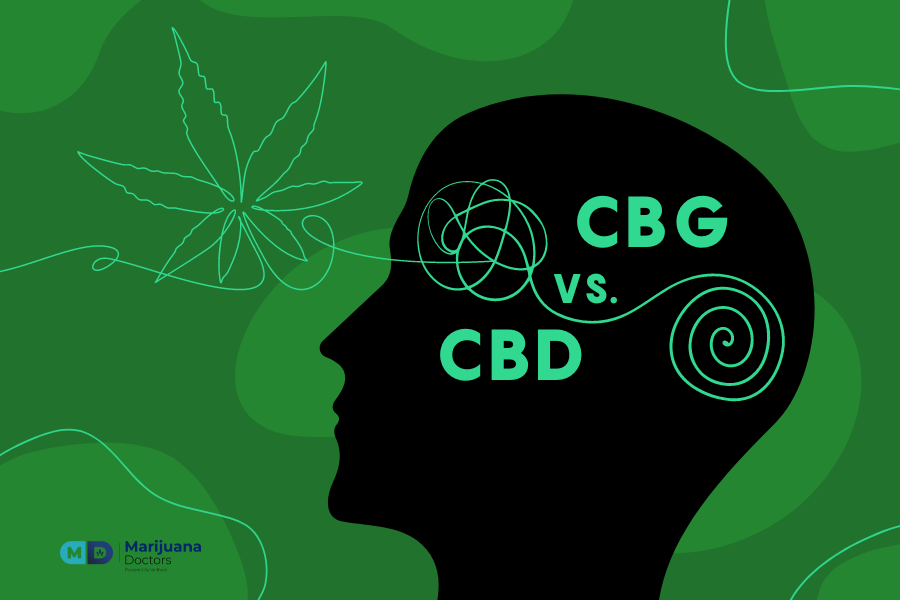
Cannabinoids could prove to be an excellent support option for various mental health conditions. Phytocannabinoids produced by cannabis plants, such as THC, CBD, and CBG, have demonstrated promise in relieving various mental health-related ailments and symptoms.
With THC being a psychoactive compound that is still highly illegal in many places, the focus for many is turning to what non-intoxicating cannabinoids like Cannabidiol (CBD) and Cannabigerol (CBG) may have to offer. When it comes to these phytocannabinoids, which one holds more therapeutic value for mental health? Let’s explore.
Before we dive into the use of cannabinoids for mental illnesses, let’s look at the reason why natural treatment options such as those offered by cannabis are being explored by many.
Mental Health America conducted a survey in 2023 that concluded some rather staggering statistics. This survey found that roughly 50 million, or 21% of the entire U.S. adult population, are living with at least one mental illness. It is estimated that over 5% of adults are experiencing a severe mental illness, with 55% of individuals never receiving treatment for their ailments. This study also found that over 12.1 million adults, or 4.8% of the adult U.S. population, reported having serious suicidal thoughts within the last 12 months.
The highest prevalence of mental illness is among young adults between the ages of 18 to 25. Anxiety and depression are two of the most common mental illnesses experienced by people worldwide, with roughly 284 million people living with anxiety and 264 million people with depression globally.
While there are many different anti-anxiety and antidepressant medications on the market today, as well as other pharmaceutical options for various mental illnesses, none of them come without a long list of potential side effects, all of which include the risk of fatality. With medical cannabis being legal in over 75% of the United States and nearly two dozen states currently having retail markets for adults over the age of 21, many people are discovering that this plant has much more to offer than just a buzz. As legalization increases to more states in the nation and countries around the world, people are discovering more and more benefits that it has to offer. Among them is its ability to assist in relieving mental illnesses.
Cannabidiol, or CBD for short, has been found through research to offer potential benefits in treating mental health conditions, including depression, anxiety, Alzheimer’s, sleep disorders, schizophrenia, insomnia, PTSD, and more. Both anecdotal testimonials and research back CBD’s efficiency in providing substantial relief to consumers with a wide range of mental illnesses.
This study from 2018 concluded that “Prolonged CBD treatment appears to have promising therapeutic effects for improving psychological symptoms and cognition in regular cannabis users.”
Additionally, other studies have found that through the use of CBD, anxiety scores decreased, and sleep scores improved within the first month of use in the majority of study participants.
In 2020 researchers witnessed similar results when testing the efficiency of CBD and CBD-containing compounds in “alleviating psychotic symptoms and cognitive impairment in patients with a variety of conditions,” which CBD did effectively.
Addiction is another mental health illness that studies have shown CBD shows efficiency in addressing naturally. Studies to date have found that the utilization of CBD can drastically reduce cravings associated with nicotine/tobacco as well as opiates, stimulants, heroin, alcohol, and even cocaine.
Cannabigerol, or CBG for short, has been found to offer antidepressant, anti-anxiety, and stress-reducing properties. While CBG is less known and found in less abundance than CBD, it has proven to provide significant benefits through both research and testimonials.
CBD has been found to help modulate emotion and emotional memory processing in addition to preventing excessive serotonin levels, which can lead to depression.
CBG has been shown to help prevent the breakdown of anandamide which can have positive implications on the mood, causing us to feel more blissful as the presence of anandamide can also increase dopamine which is a vital part of our body’s natural reward system.
CBG has been shown to increase GABA production as well as serotonin in the brain. Because of this, it is believed that this cannabinoid offers significant antidepressant and anxiolytic properties.
As you can see, both CBD and CBG have their respective places within the repository of tools that we desperately need to fight mental illness, not just in The United States of America but globally. However, it is likely that one is not better than the other. In fact, it is quite possible that they may work best together. There is a theory known as the Entourage Effect that hypothesizes that cannabinoids, terpenes, and other phytonutrients produced by cannabis work best when they are utilized together rather than when they are isolated. For this reason, many people are choosing to opt for a broad-spectrum cannabis product that includes a wider range of cannabinoids and phytonutrients rather than CBD or CBG isolate-derived products.
If you are curious about the utilization of cannabinoids for you or a loved one and are exploring natural alternatives to pharmaceuticals, cannabis may be a great option. Medicating with cannabis doesn’t require smoking cannabis, nor does it always require the use of psychoactive cannabinoids such as THC. However, there is also significant evidence supporting the use of THC as well for mental illnesses and much more. If you are experiencing suicidal thoughts or require immediate mental health assistance, dial 988 from any phone or visit 988lifeline.org. If you would like to speak with a cannabis professional regarding the use of cannabinoids for mental health, I invite you to book an appointment here to apply for your medical cannabis card.
No Information on MarijuanaDoctors.Com should be used to diagnose, treat, prevent or cure any disease or condition. You can view our Full Disclaimer here.